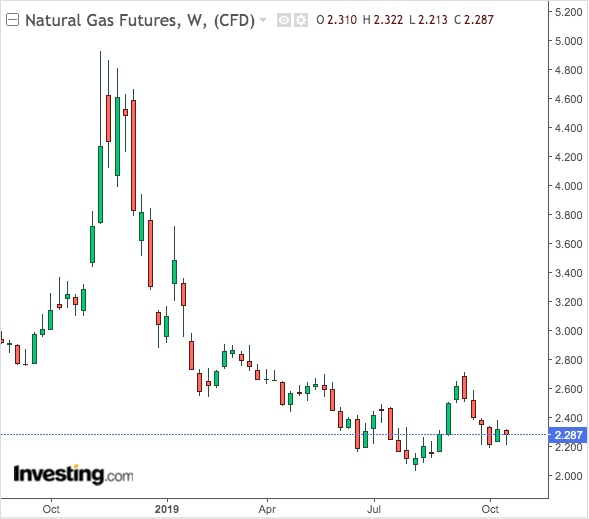Sunnybrook Health Sciences Centre selects Oracle Health for new EHR system
The winter optimism seen among natural gas punters in October 2018 isn’t prevalent yet this year, despite signs of strong early cold resurfacing in the United States.
The divergence is resulting in a market conundrum that’s tripping up both investors and analysts.
More Gas In Storage Than Forecast In Four Out Of Five Weeks
Weather forecasts indicate that utilities should be burning more gas as consumers turn on the heat more frequently at homes and businesses.
Yet, utilities have been injecting more gas into storage than forecast in four of the past five weeks, proving that production of the fuel has been greater than thought.
Dan Myers, analyst at Houston-based gas risk consultancy Gelber & Associates, said in a report issued on Wednesday:
“Recent production growth is limiting the market’s gains and putting contracts early next year at ease, as storage inventories now sit above the five-year average and are expected to expand that surplus with tomorrow's injection report.”
That gas injection report, due at 10:30 AM ET (14:30 GMT) today, is likely to show a stockpile growth of 88 billion cubic feet last week versus a 58 bcf build a year ago, according to a consensus of analysts tracked by Investing.com.
At Wednesday’s settlement, the front-month gas contract on the New York Mercantile Exchange’s Henry Hub settled at $2.28 per million metric British thermal units.
Gas Pricing From Early Cold Couldn’t Be More Different Than 2018
Barring major shifts, the front-month contract is likely to end the week down 1.4%. So far, over the past five weeks, Henry Hub’s benchmark contract has rallied only once—gaining nearly 5% last week. In the prior four weeks, it lost 5.9%, 2.2%, 5.1% and 3.1% respectively.

Juxtaposed against the market’s performance of a year ago, the comparison looks like night and day.
For the week ended Oct. 21 2018, benchmark gas futures ended down 2%. But in the five preceding weeks, it rose at a steady beat of 2.8%, 0.6%, 4.5%, 1% and 7.6%.
Some Are Tinkering With Their Pricing Models...
Now, some analysts who had tracked similar cold weather patterns in the mid-September to late October periods of the past two years are rethinking their pricing models.
Said Myers:
“The front month continues to garner support from coming cold weather, although not so much that it can break through resistance at $2.30.”
Dominick Chirichella, who studies market risk and trading models for the Energy Management Institute in New York, had similar thinking to Myers, saying any gains lately “were likely the result of short covering”.
He added:
“The latest short-term temperature forecast is still projecting colder than normal temperatures across most of the U.S.”
...Others Are Convinced The Market Won’t Rally Until 2020
Some analysts, like Scott Shelton at ICAP in Durham, North Carolina, think the market won’t have what it takes for a price breakout until probably early 2020.
Wrote Shelton in a Wednesday report:
“The flat price seems listless but appears to go down much easier than it goes up as the winter optimism that we had last year due to low storage into winter simply isn’t there this year.”
He said his view was “slowly changing to neutral or bearish", noting "the optics of natural gas don’t look very good here.”
“The demand side did not disappoint in terms of weather this year, once again with solid power demand. But yet here we are…near the lows. That’s ‘telling’ to me. All of the winter spreads in Q1 look overvalued to me, when you take last year out of the picture.”
